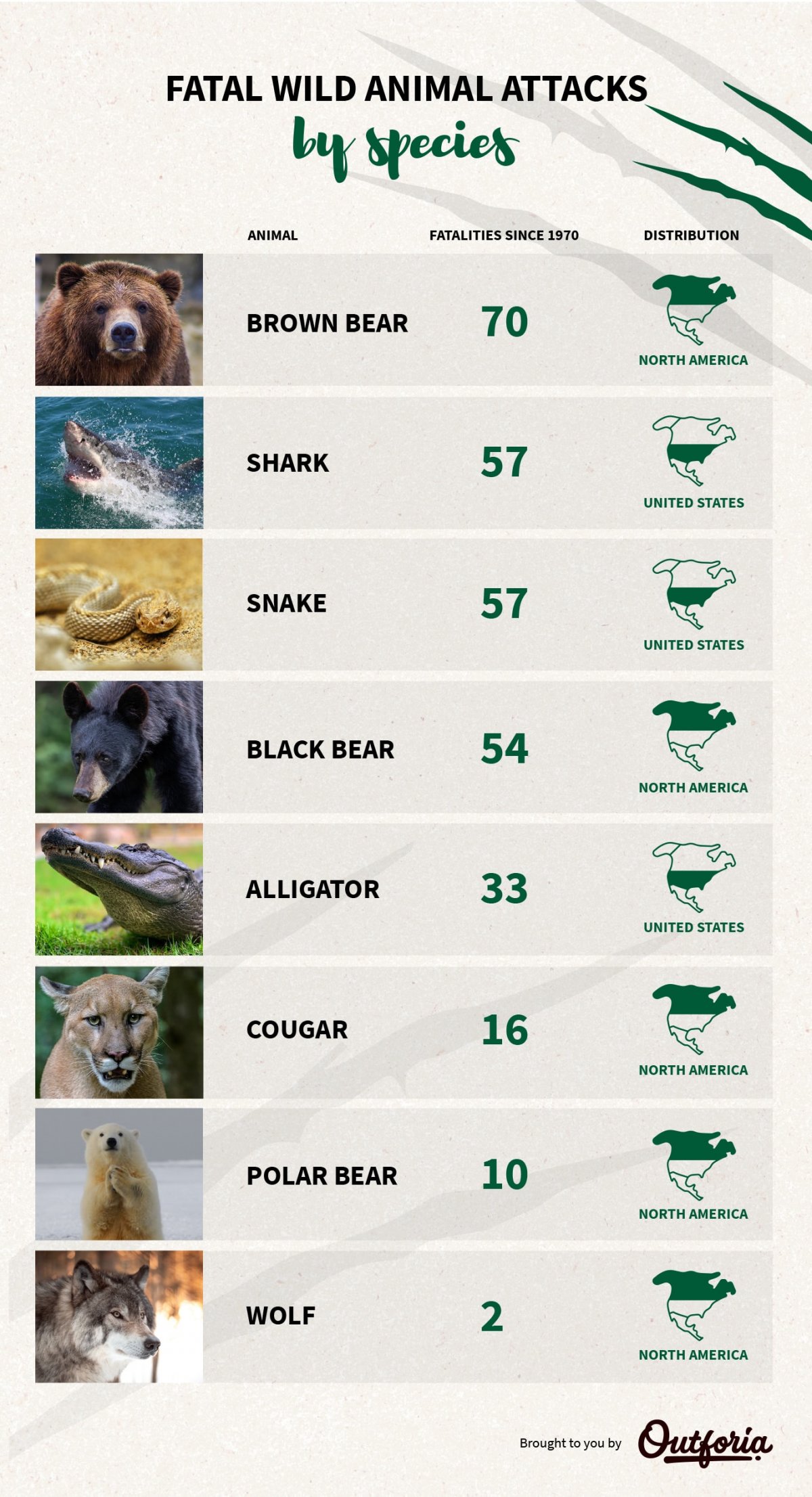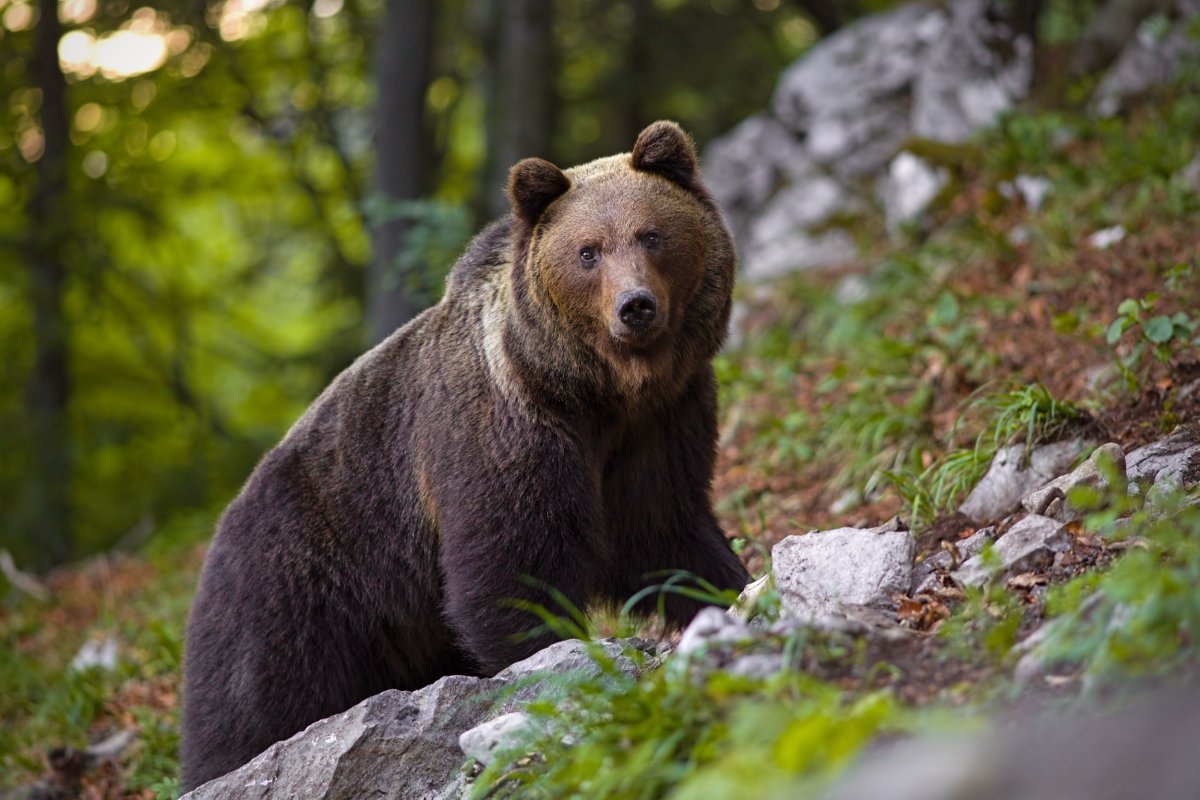Across the United States, there are thousands of species of wildlife, big and small. While many of these animals are harmless to humans, some can cause injury and sometimes even death if encountered at the wrong place at the wrong time.
Outforia, an outdoor resource site based in Norway, looked at the relationship between certain parts of the U.S. and fatal animal attacks, as well as which animals were most dangerous.
To find some answers, Outforia examined the number of deaths caused by different animals in North America over the past 50 years. From there, it was able to deduce which animals were "most deadly."
The No. 1 most dangerous animal, Outforia found, is the brown bear, which has killed 70 people in North America since 1970. No. 2 is the shark, which has reportedly fatally attacked 57 people in the U.S. during the same period.
Carl Borg, the founder of Outforia, told Newsweek that the data it worked with sometimes broke down fatality locations by covering only the U.S., whereas other data covered North America, including Canada. The report reflects this differentiation.

Borg told Newsweek he was surprised to see how rare deaths by wolf attacks are.
"This is quite unlike what most people would expect based on popular culture and belief," he said.
But where are these fatal attacks most concentrated? The site used data from the U.S. Centers for Disease Control and Prevention showing deaths from 1999 to 2020.
1. Texas: 520 deaths
2. California: 299 deaths
3. Florida: 247 deaths
4. North Carolina: 180 deaths
5. Tennessee: 170 deaths
6. Georgia: 161 deaths
7. Ohio: 161 deaths
8. Pennsylvania: 148 deaths
9. Michigan: 138 deaths
10. New York: 124 deaths
The site found that Delaware, North Dakota and Rhode Island were the least dangerous states in terms of fatal animal attacks, all reporting zero over the same 20-year period.
Jamey Cantrell, the animal services director in Plano, Texas, said he thinks his state's high number of fatalities comes from a lack of laws concerning which animals are legal to keep. When he first started working with animals 26 years ago, there were no statewide regulations against keeping exotic animals, unless a city or county enacted them on its own.
"People would be living in residential neighborhoods and have cougars, bobcats or tigers," Cantrell told Newsweek. "Any time that you have animals like that in close proximity to people, you will always have potential for there to be accidents and people to get hurt."
He said in Texas there are very few natural predators in the wild, so most of these fatalities, he believes, would have come from a pet. While today the state requires counties to ban or restrict the keeping of these animals, he added, the law is not strictly enforced.
"The residents here tend to have the attitude of 'it's my property, I can do what I want to on it,'" he said.
The National Park Service says bear attacks are rare within its parks, although they have happened. "Each bear and each experience is unique; there is no single strategy that will work in all situations and that guarantees safety," the NPS site reads.

The NPS says if you are attacked by a brown bear, leave your pack on and "play dead."
"Lay flat on your stomach with your hands clasped behind your neck. Spread your legs to make it harder for the bear to turn you over. Remain still until the bear leaves the area," the NPS site explains.
"Fighting back usually increases the intensity of such attacks. However, if the attack persists, fight back vigorously. Use whatever you have at hand to hit the bear in the face," the site adds.
Updated 10/15/21,10:00 a.m. ET: This story has been updated to include a comment from Jamey Cantrell, the animal services director in Plano, Texas.
Uncommon Knowledge
Newsweek is committed to challenging conventional wisdom and finding connections in the search for common ground.
Newsweek is committed to challenging conventional wisdom and finding connections in the search for common ground.
About the writer
To read how Newsweek uses AI as a newsroom tool, Click here.






